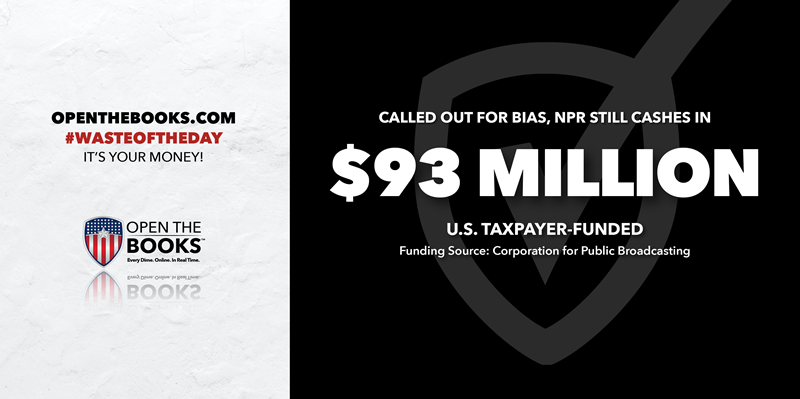
Embattled Illinois Mayor’s Sky-High Salary Revealed
May 13, 2024

Topline: Residents of Dolton, Ill. have called Tiffany Henyard “America’s worst mayor,” and opinion writers at the Chicago Tribune called Henyard’s salary “out of whack” based on reports she would take home $277,000 in one year.
But Mayor Henyard actually took home a shocking $365,000 in total compensation last year — more than double any other official in her township — according to an open records request filed by OpenTheBooks.com.
Key facts: Henyard made at least $307,000 in gross earnings last year as the supervisor of Thornton Township, which includes Dolton. Then she double-dipped and made a $58,000 salary as mayor.
The next-highest paid employee in the township made $187,000. More than half of the other township supervisors near Chicago make less than $30,000.
In an odd twist, Thornton’s next supervisor will only make $25,000 - if it is not Henyard. The township's board passed a law that will lower officials’ salaries only if the current board is not reelected, which critics claim is part of Henyard’s effort to run unopposed.
Attorney Burt Odelson, Henyard’s political rival, told Fox32 Chicago it’s “illegal in so many ways.”
The noted Edgar County Watchdogs have filed three Freedom of Information Act lawsuits demanding the details of Henyard’s compensation. Thornton Township recently settled their case and is currently producing payments, W-2’s, and other details so investigators can follow the money.
Background: In March, Henyard vetoed a resolution that all four trustees supported to investigate the mayor's purported misuse of funds, demanding her to submit the village's financial records and calling for an FBI investigation
Then in April, the Village of Dolton - which is one of the many communities that comprise the township, which itself is part of Cook County - hired ex-Chicago mayor Lori Lightfoot for $400 an hour to investigate Henyard.
It’s a steep price tag for a process that might not accomplish much — Henyard herself can veto the investigation, and Lightfoot has no actual legal power — but it pales in comparison to the money Henyard has wasted since she took office in 2021.
The controversy began when Henyard hired her campaign staffer and convicted child sex offender Lavelle Redmond as the village’s code enforcement officer.
A recall vote last June would have removed Henyard from office, but she had it thrown out in court on a technicality — and celebrated at her next board meetingwith a disco singalong.
This April, Henyard was sued by a former employee who says she was fired after accusing a village trustee of sexual assault during a work trip to Las Vegas.
WGN9 Chicago reported that Henyard spent almost $103,000 on travel in the past year, including first-class flights for up to $3,741 per ticket.
She also billed the city $7,650 for “assistants” who did her hair and makeup for two months and spent hundreds of thousands on her security detail, including paying one guard $13,000 for supposedly working 303 hours in two weeks.
Supporting quote: Fox News reported on a public township meeting in April where Henyard denied all wrongdoing.
“Everybody wanted to continue to be a s–tshow and not really show facts as it relates to what’s really going on in our township,” Henyard said. “Guess what? I am the youth, I am the future, no matter what you think or may say.”
Summary: Lightfoot’s investigation might not have legal authority, but the FBI’s visit to Dolton village hall certainly does. There’s no official confirmation that the visit was related to Henyard, but her situation could soon become much more serious.
Feds To Spend $85 Million On Remote Maine Border Crossing
May 14, 2024

Topline: The General Services Administration plans to spend $85 million to $95 million on renovations at a border crossing site in Maine, but the station is barely even being used.
Key facts: The Coburn Gore Land Port of Entry is the fifth-most expensive of 20 Canadian border crossing sites being renovated under the 2021 Bipartisan Infrastructure Law.
Four other Maine border sites are getting funds, but none more than $45 million. The government has offered no explanation for the steep price tag at Coburn Gore and is not being transparent about the fact that the site barely has any visitors.
The Department of Transportation stopped tracking visitors to Coburn Gore in 2018, and the GSA refused to provide more recent data to the Portland Press Herald. Even the outdated numbers show only 200 visitors per day, making it one of the least-traveled crossings in Maine. Reporters said they never saw more than two cars at once during a visit to the site this March.
The GSA said the construction will benefit surrounding restaurants and stores, but the Portland Press Herald pointed out that the only business near Coburn Gore crossing is a single gas station.
Staff say they need money to expand their office space and buy a camera to read license plates, but that should only cost a fraction of $95 million.
Background: The Coburn Gore renovations continue a recent trend of a disproportionate amount of federal money flowing into Maine.
The Inflation Reduction Act is funding 156 “clean construction” projects around the country that use sustainable technology. Eight of them are in Maine. Only New York and Texas have more.
Maine also got $590 million in earmarks in this year’s federal budget, mostly for infrastructure. Only four states got more, OpenTheBooks’ researchers found.
That’s surprising given that Maine has the ninth-lowest population of any U.S. state.
Meanwhile, 372 bridges in Maine remain “structurally deficient,” meaning they have cracks or damage that could cause safety issues in the future.
The federal government gave Maine $90 million over the last two years to fix its bridges, and the same amount is going toward a single project at Coburn Gore.
Summary: Perhaps media coverage of Coburn Gore will increase traffic and undo some of the issue. As it is, many are seemingly unaware of this port of entry to Canada.
NY State-Funded College Groups Pass Anti-Israel Resolutions
May 15, 2024

Topline: Student governments at three of the four largest public universities in New York passed resolutions in April urging administrators to “Boycott, Divest and Sanction” (BDS) the state of Israel.
The student governments at State University of New York, or SUNY, campuses at Binghamton, Albany and Stony Brook collectively received $11 million in funding last year and may have violated state law by using taxpayer money to support BDS resolutions.
Key facts: The BDS movement describes itself as a way to fight for Palestinian freedom from supposed “Israeli apartheid” and end Israel’s “genocidal war” against Hamas.
The Anti-Defamation League says that in practice, BDS “aims to dismantle the Jewish state and end the right to Jewish national self-determination.”
New York State’s Executive Order No. 157 bans state funds from “furthering the BDS campaign in any way, shape or form, whether directly or indirectly.”
All three schools are funded by the state, and their student governments operate using tuition money. Binghamton’s Student Assembly collected $4.5 million last year, Albany received $2.8 million and Stony Brook got $3.7 million, according to their tax forms. Some of the funds are used to pay annual stipends to members.
The resolutions ask the schools to cut all ties with companies that support Israel, even those with a tangential connection. Stony Brook University, for example, recently received a $362,000 grant — to study clean energy — from IBM, which operates in over 170 countries including Israel.
One student at Stony Brook’s meeting about the resolution used a swastika as his profile picture on the Zoom call, according to the student-run newspaper The Statesman.
Students at Albany’s meeting shouted “Shame” at one Jewish attendee who opposed the resolution, the Albany Student Press reported.
The student government president at Buffalo State, the largest New York public university, refused to let students vote on a BDS resolution, according to The Spectrum.
Critical quote: New York Assembly members Charles Lavine and David Weprin wrote a letter to the SUNY chancellor demanding that Binghamton revoke its Student Association’s charter for using funds in violation of Executive Order No. 157.
“[We] wonder why the Association would engage in such rash and ill-advised action without doing the most basic research into its legal authority to so act,” the letter says. “Perhaps the emotion of the moment got the better of those who advanced and voted to support the resolution. This at a time when cooler heads need to prevail.”
Supporting quote: The Binghamton Student Association disagreed that its resolution violates the law.
“New York State Executive Order 157 does not apply to the Student Association or the Student Activity Fee as it solely regulates state investments, such as pension funds, not state funding provided to Binghamton University,” the resolution reads, according to the student-run Pipe Dream.
Summary: As the FBI continues to investigate antisemitism on college campuses, it’s crucial that public money is kept away from those pushing hateful rhetoric.
Throwback Thursday: Nonprofit Goes Off the Grid, Gets Grant Anyway
May 16, 2024

Throwback Thursday!
Topline: In 2005, the federal government gave a $500,000 grant to music education group B InTune and directed them to report back a year later on how the money was spent.
Government officials couldn't even get in touch with B InTune for years afterwards, but they awarded them another $430,000 in 2008.
That’s according to the “Wastebook” reporting published by the late U.S. Senator Dr. Tom Coburn. For years, these reports shined a white-hot spotlight on federal frauds and taxpayer abuses.
Coburn, the legendary U.S. Senator from Oklahoma, earned the nickname "Dr. No" by stopping thousands of pork-barrel projects using the Senate rules. Projects that he couldn't stop, Coburn included in his oversight reports.
Coburn's Wastebook 2008 included 65 examples of outrageous spending worth more than $1.3 billion, including the $430,000 music grant — the combined $930,000 grants would be worth $1.3 million today.
Key facts: B InTune received the money in 2005 to develop lesson plans about funk music and Nobel Peace Prize winners.
Then-House Majority Leader Steny Hoyer (D-MD) earmarked even more money for the group in the 2008 federal budget — so the Washington Post asked the Education Department whether the first grant had been spent efficiently.
The government’s response? “We don’t know.”
B InTune never submitted a spending report, which was due in September 2006.
Officials tried to contact the nonprofit, but its old phone number and email were out of service and its website contained no contact information.
The Washington Post managed to get in touch with B InTune, who then reached out to the Department of Education.
To this day, it’s unclear how the grant money was spent. Some of the funds were designated for B InTune to hire former school superintendent Joan Kozlovsky, but she told the Washington Post she hadn’t spoken to the nonprofit in years. B InTune said other projects were carried out with delays after a senior consultant got sick.
None of that stopped Hoyer from filing the earmark in 2008. The Washington Post noted that B InTune employees had contributed $31,000 to Hoyer’s political action committee in the past.
Summary: If a group is going to take a $430,000 handout from the federal government, answering the phone should at least be a required courtesy.
NPR Funding Questioned After Accusations Of Left-Wing Bias
May 17, 2024

Topline: Weeks after a now-former National Public Radio senior editor evisceratedthe station for what he called “advocacy” against former President Donald Trump, GOP lawmakers are questioning the $525 million that public media outlets receives annually from the federal government, and the $93 million of it that winds up in NPR coffers.
Key facts: Uri Berliner has worked at NPR for 25 years. In a recent opinion piece in the Free Press, he said the station’s news segments show a “distilled worldview of a very small segment of the U.S. population” despite receiving federal funds to act in the public interest.
Berliner claims that after the 2016 election, NPR engaged in “efforts to damage or topple Trump’s presidency.” He accused his colleagues of unbalanced coverage of Trump’s alleged collusion with Russia and the origins of Covid-19.
By 2023, 67% of NPR listeners described themselves as “very or somewhat liberal” — up from 37% in 2011, according to Berliner. NPR’s headquarters in Washington D.C. has 87 registered Democrats as editors and no Republicans.
Fox News quickly supplemented Berliner’s story with dollar figures.
The federal government sent $525 million this year to the Corporation for Public Broadcasting, which helps fund NPR, PBS and more. NPR claimed last year that less than 1% of its budget comes from that source.
However, the CPB funds local radio stations around the country, which in turn pay NPR for the right to broadcast its content. That contributes to the $93 million NPR received from “contracts with customers” in 2022 — about a third of its $300 million total budget.
That $93 million is given to local radio stations for the explicit purpose of paying for NPR content, Howard Husock, a domestic policy expert and a former member of the CPB board of directors, explains at The Hill.
Rep. Jim Banks (R-IN) and Sen. Marsha Blackburn (R-TN) announced separate plans in April to sponsor bills that would end federal funding to NPR.
Similar bills have not gained much traction, including former President Richard Nixon’s attempt in 1971 and Rep. Ronny Jackson’s (R-TX) bill last year.
Critical quote: A group of seven Republican Congress members wrote a letter to NPR CEO Katherine Maher expressing concerns over the station’s journalistic standards.
“If NPR’s goal was to become an echo chamber, mission accomplished. But as a publicly funded entity, you are responsible for providing impartial coverage that accurately informs all Americans, regardless of political affiliation,” the letter said.
Background: NPR is not the only company receiving taxpayer money to produce questionable content.
Researchers at OpenTheBooks.com recently found that the federal government spent $324 million since 2020 on programs that produced podcasts as part of their work.
The list of 58 podcasts covered topics like Swedish gender neutral pronouns, AI-generated erotic literature and the “important role” of Satanists in America.
These were all topics deemed to have “artistic merit” by the National Endowment for the Arts.
Summary: Berliner was just one senior editor at NPR to call out its biased reporting, and it cost him his job, resigning shortly after his piece was published. His calls to reinstate a level of journalistic integrity at an institution he loved and respected should be heard and acted upon, or it should no longer receive taxpayer funds.
The #WasteOfTheDay is presented by the forensic auditors at OpenTheBooks.com.